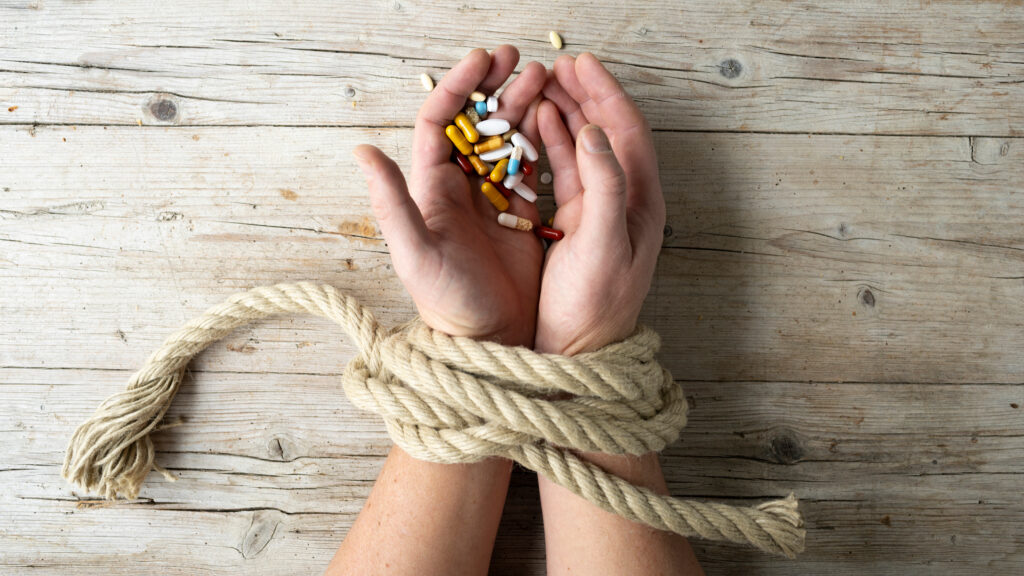Addiction can affect anyone and disrupt lives in many ways. It can strain relationships and impact overall well-being—especially when the drug is particularly addictive.
At Casa Capri Recovery, we understand the unique challenges women face in recovery. Our mission is to support and care for women struggling with addiction, helping them reclaim their lives. Here, we’ll offer more information about the most addictive drugs and substances, highlighting the dangers and the importance of seeking help if you or a loved one is facing addiction.

What is Addiction?
Addiction happens when someone can’t stop using a substance, even though it’s causing harm. It involves both physical and mental dependency, where the body and mind rely on the substance.
Over time, addiction changes the brain, making it harder to feel pleasure without the substance. The causes of dependence on addictive drugs include factors such as genetics, environment, or personal experiences. Overcoming addiction requires comprehensive treatment from trained professionals.
What Causes Addiction?
Addiction doesn’t happen overnight, and not all substances are equally addictive. Several factors contribute to the development of addiction:
Chemical Makeup of the Substance
Some substances are more likely to cause addiction due to their chemical properties. These substances can trigger intense cravings and dependency, and discontinuing use leads to withdrawal symptoms.
Brain Chemistry
Addictive substances often cause a surge of dopamine, one of the brain’s “feel-good” chemicals. Over time, the brain produces less dopamine naturally, making it difficult to feel pleasure without the substance.
Genetics
A person’s genetic makeup can influence their susceptibility to addiction. If addiction runs in the family, there is a higher chance of developing it.
Environment
Environmental factors—such as exposure to drugs at an early age, peer pressure, and stress—can increase the likelihood of addiction.
Personal Experiences
The interplay between women and addiction often involves personal experiences like traumatic events, mental health issues, and emotional distress, highlighting the need for gender-specific support.
Next Steps
If you’re struggling with addiction, you don’t have to face it alone. At Casa Capri, we offer expert, women-centered care in a supportive and nurturing space—designed by women, for women. Our team is here to help you heal with purpose and connection.
Call our admissions team for a free, confidential chat—we’ll even check your insurance and estimate any costs upfront.
The Impact of Addiction on Women
Addiction uniquely affects women in various ways, both in the short term and long term.
Short-Term Impacts
- Emotional changes: Women may experience mood swings, anxiety, or depression related to substance use.
- Social isolation: Addiction can lead to feelings of loneliness and isolation from family and friends.
- Health issues: Short-term health problems—such as nausea, fatigue, and sleep disturbances—are common.
Long-Term Impacts
- Physical health problems: Long-term addiction can cause severe health issues, including heart disease, liver damage, and neurological problems.
- Mental health disorders: Prolonged substance use can lead to chronic mental health issues like anxiety, depression, and PTSD.
- Relationship strain: Ongoing addiction often results in strained relationships with loved ones and can affect family dynamics.
Most Addictive Drugs & Substances
Many substances have the potential to be addictive, but some are particularly notorious for their strong grip on users. These substances can quickly lead to dependence and have severe effects on health and well-being. Here are some of the most addictive substances:
Alcohol
Alcohol is widely used and can lead to physical dependence and severe withdrawal symptoms. Long-term abuse can cause serious health problems like liver disease and mental health issues.
Cocaine
Cocaine is a powerful stimulant that quickly leads to addiction. It causes intense euphoria but has short-lived effects, leading to repeated use. Cocaine addiction can cause severe heart and brain damage.
Tramadol
Tramadol is a pain medication with a high risk of addiction. It can cause physical dependence and withdrawal symptoms.
Xanax
Xanax, used for anxiety and panic disorders, has a high potential for addiction. Misuse can lead to dependence and severe cognitive problems. As a benzodiazepine, Xanax is in contention for being the most addictive prescription drug.
Recognizing Addiction
Recognizing the signs of addiction is the first step toward recovery. Here are some common signs to look out for:
Increased tolerance
You might need more of the substance to feel the same effects as before. This can be a sign that your body is getting used to the substance and you’re becoming dependent on it.
Withdrawal symptoms
When you stop using the substance, you may experience physical or mental symptoms such as anxiety, irritability, nausea, or headaches. This indicates your body is craving the substance.
Neglecting responsibilities
Addiction often leads to ignoring important duties at work, school, or home. You may find yourself missing deadlines, skipping classes, or neglecting household chores.

Continued use despite consequences
Even if you know the substance is causing problems in your life, like health issues or relationship troubles, you keep using it. This is a strong indicator of addiction.
Treatment and Recovery
Treating addiction involves medical care, therapy, and support. At Casa Capri Recovery, we create personalized treatment plans for each woman. Our approach includes detox, residential treatment, therapy sessions, and holistic practices to heal the mind, body, and spirit. Our team is dedicated to providing the tools and support needed for lasting recovery.
Finding Hope and Help
At Casa Capri Recovery, our approach is women-centric and trauma-informed, ensuring every woman feels supported and nurtured throughout her recovery journey. It’s important to forgive yourself during this process. Understanding that setbacks can happen and being kind to yourself during tough times can make a significant difference.
If you or a loved one is struggling with addiction, we encourage you to reach out for help. Casa Capri Recovery offers a safe, compassionate space where women can heal, grow, and rediscover their strength.

Next Steps
If you’re struggling with addiction, you don’t have to face it alone. At Casa Capri, we offer expert, women-centered care in a supportive and nurturing space—designed by women, for women. Our team is here to help you heal with purpose and connection.
Call our admissions team for a free, confidential chat—we’ll even check your insurance and estimate any costs upfront.
Frequently Asked Questions
What is the most addictive drug?
Many drugs have the potential to be addictive, but some are particularly notorious for their strong grip on users. These include alcohol, cocaine, tramadol, and Xanax. Each of these substances can quickly lead to dependence and have severe effects on health and well-being.
What are the most common signs of addiction?
Recognizing addiction involves looking for increased tolerance, withdrawal symptoms, neglect of responsibilities, and continued use despite negative consequences. Emotional changes like mood swings and anxiety are also common indicators.
Why are some substances more addictive than others?
Some substances are more addictive because they cause a significant surge of dopamine in the brain, creating intense feelings of pleasure. This leads to a cycle of craving and dependency, making it hard to feel good without the substance.
How does addiction impact women differently than men?
Addiction impacts women differently than men by often progressing more rapidly, with women experiencing quicker escalation from use to dependence and suffering more severe health consequences. Additionally, women face unique social and psychological challenges, such as higher rates of trauma and co-occurring mental health disorders, which influence their unique addiction experiences and recovery needs.
What are the health risks associated with long-term alcohol use?
Long-term alcohol use can lead to serious health problems like liver disease, heart issues, and mental health disorders. It can also cause severe withdrawal symptoms, which require medical supervision during detox.
How does Casa Capri Recovery support women in overcoming addiction?
Casa Capri Recovery provides personalized treatment plans that include detox, residential treatment, therapy sessions, and holistic practices. Our women-centric, trauma-informed approach ensures every woman feels supported and nurtured throughout her recovery journey.
Can addiction be treated successfully?
Yes, addiction can be treated successfully with a combination of medical care, therapy, and ongoing support. At Casa Capri Recovery, we focus on holistic healing, addressing the mind, body, and spirit to help women achieve lasting recovery and reclaim their lives.



